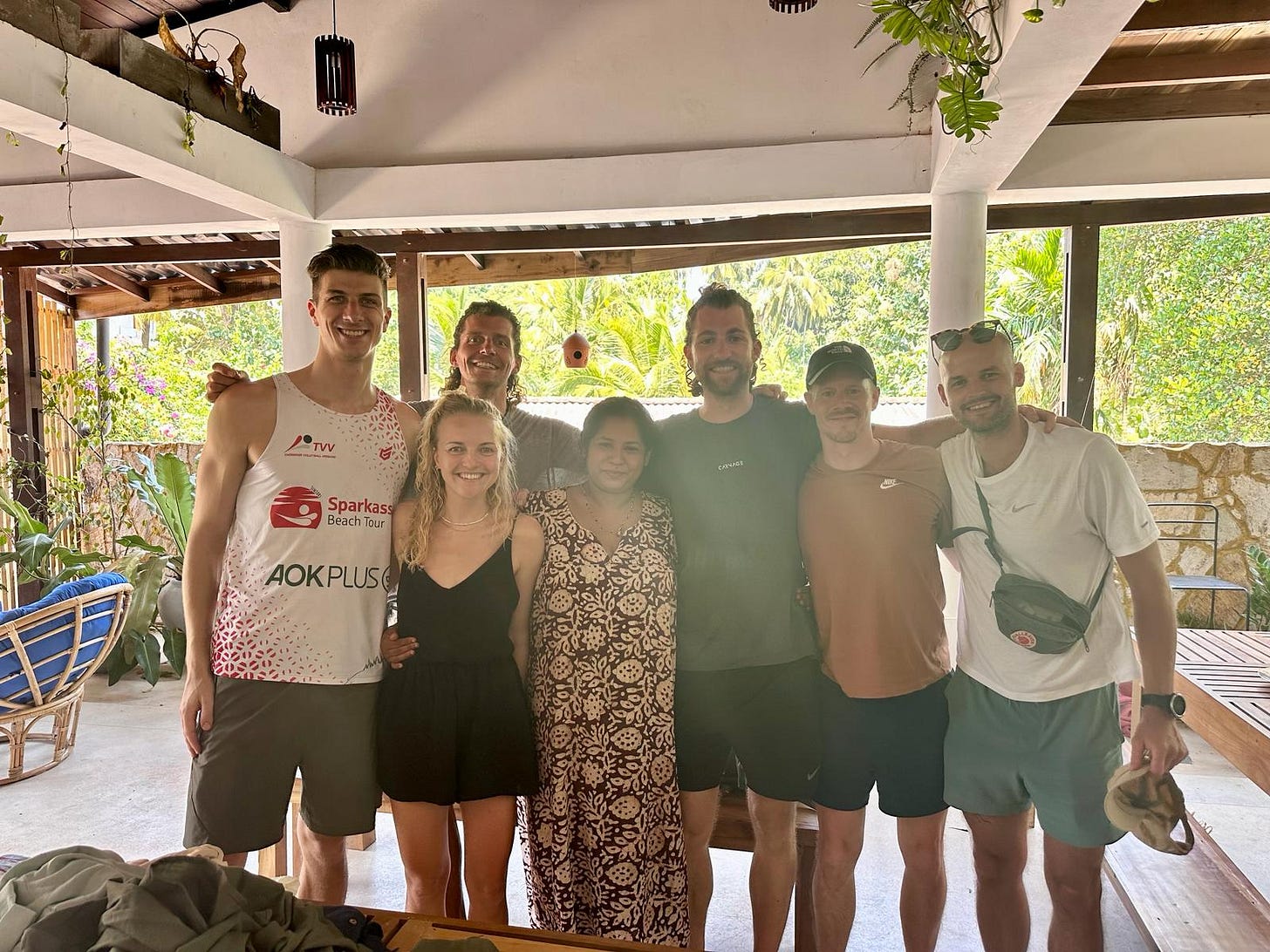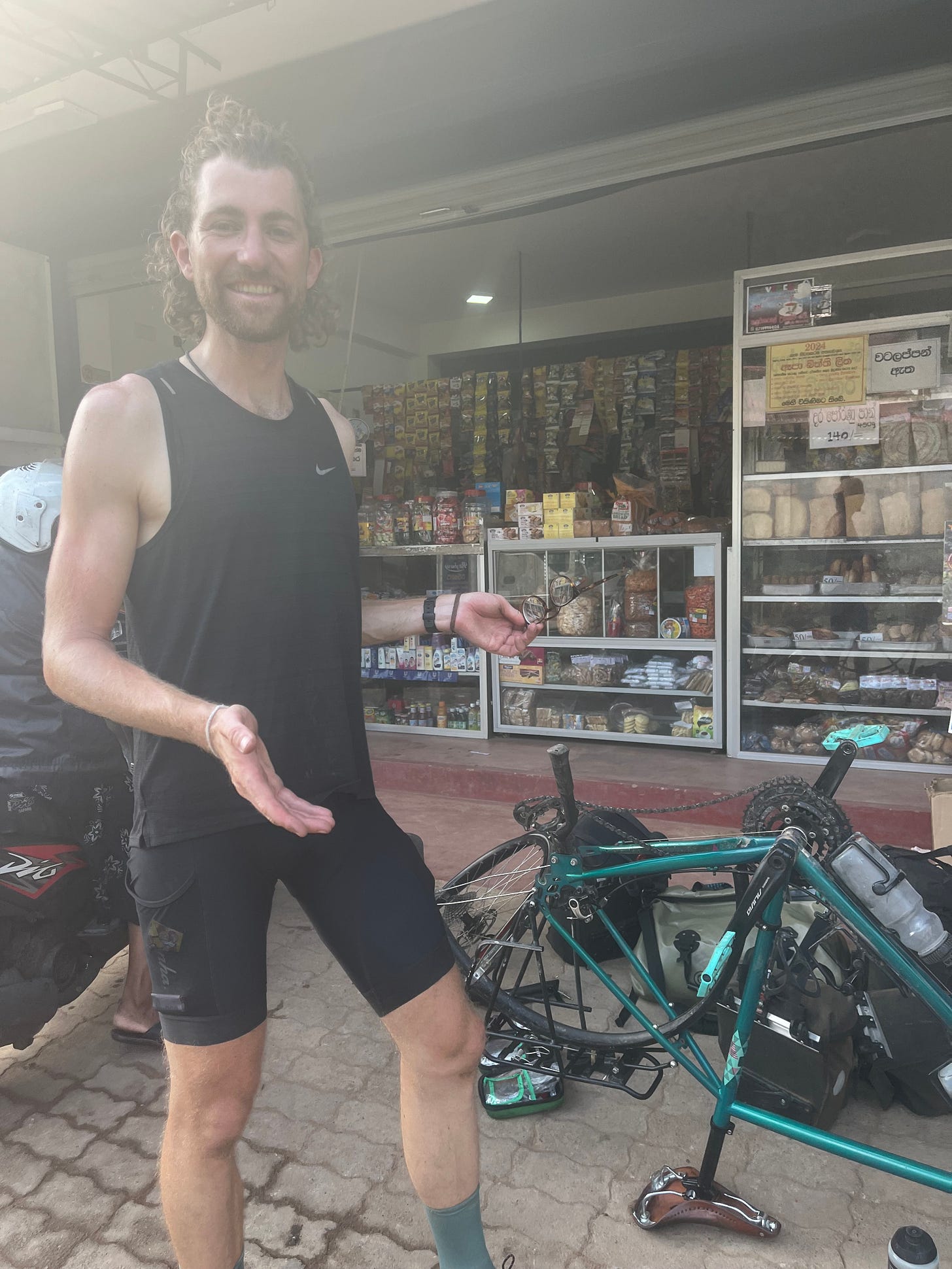174 | A story about a girl who tells stories
Hiriketiya, Sri Lanka
I’ve been on the coast long enough that my friends are leaving(!), rather than me always being the one saying goodbye and peddling off. It’s harder to be left than to leave; one feels a little hopeless. I’m unsure if I could live long-term in a tourist village—it’s too transient; luscious Hello’s are followed by halting goodbyes—just as the bus drives off. Soon I’ll say my own Goodbye and roll north in the humidity, towards Ella and Kandy. Finally, I’ll reach Jaffna, where I will take a ferry to India (a couple of weeks away, at the very least).
I’ve been doing an Ashtanga yoga course. Stretching out my willowy cyclist body is as elegant as bending splintered wood—as effortless as looping stiff fencing wire. Sri Lanka reminds me of Huxley’s Island with its shimmering banana leaves and its flat blue chemical sky. There is much to see, so yesterday I left the thin slip of coastal tourism and cycled inland, into the rainforest, and up to Rock Temple, which has sat since antiquity — for 2,200 years — watching rice paddies. Climbing the six hundred steps, I wandered barefoot around delicately painted kaleidoscopic caves, built as if to materialise psychedelic visions; each cave hosts Buddha, lying asleep and electric yellow, five metres long with eyes half closed. In the quiet, I was grateful to the monks who committed their now nameless lives to the painted caves.
The story of a girl who tells stories begins when cycling over hard mud, weaving through the rainforest which dominates Sri Lanka like tremendous green cloud. The sky widened and brightened as I left the forest thicket and in the distance I spotted a brunette Westerner cycling towards me: pale shoulders—lightly burnt—on a Dutch bike, upright with high handlebars. She surprised me because it had been a few days since I’d encountered a tourist.
We slowed up peddling, but neither of us stopped as we passed one other—her to my left. I said “Hello,” and she smiled “Hello”.
Looking back over my left shoulder, I wobbled slightly. “Do you live here?!” I called out.
She glanced back and wobbled, “Yes, why?”
But twenty yards separated us and we both teetered on our two wheels; the rainforest's cooing and humming muffled our conversation.
She’s from Germany, I almost heard, and “I’m British,” I shouted. But there is little else to say, and I had nearly tipped onto my panniers. Throwing up my arm, I waved goodbye and pushed my peddles down, forcing the loaded bicycle down towards the coast.
I wondered if we might meet again, and we soon did. A few days later, I bumped into the German girl from the rainforest (sans bicycle) on a stone tidal wall by the bay’s cream-sand beach. Her name is June, and she told me she’s a storyteller. Her story fascinated me. In ten minutes, she taught me the power of curating our stories to enhance our lives.
June told me that at the start of last year, she had worked a toxic job that she hated. Her bosses were conservative and inflexible; she felt stifled. She felt as though she was trapped in an elevator and needed her freedom. The breathless pressure ratcheted in routine morning meetings; she could feel the days snap by, each lost forever. In such suffocating tedium, years pass like weeks. She needed a new job and a rethought lifestyle—but how?
Simultaneously, June discovered a novel-writing competition; submissions were six months away, due in October 2023. As if selected by fate, she felt that notorious literary fever to write. But, June wondered, what could she write about? She might write of a toxic job and how, hypothetically, someone could leave it to reimagine their life…
So June invented a semi-autobiographical character called Lesley. Lesley is June’s age; she had the same compulsive aspiration to be free—the desire to explore the world—and a toxic job.
The competition required the novel to be at least twelve chapters. June sat with Lesley’s life in her hands, like moulding clay, and began to write the names of the chapters. How would she mould Lesley’s life and, by doing so, shape her own?
Out of all universal potentialities, June then had to decide. And without comprehending the moment’s significance, June sketched the chapter headings to Lesley’s life.
Chapter one: Lesley leaves her toxic job.
Chapter two: Lesley becomes a yoga instructor.
And so on. Finally, by chapter twelve, Lesley has left Germany for Sri Lanka and now teaches yoga in a retreat centre in a rainforest clearing.
June then lived out her fictional story in real life, if only to have the experience to write about.
Lesley only had twelve chapters to live—twelve significant moments.
At this point, June realised that life is a flow of decisions, and we make them at the expense of all other opportunities. When we decide to live out a chapter, we choose not to live others. For now, I can only live my cycle-touring life: I can’t start a family, I can’t be an entrepreneur. I have had to choose, and it’s a choice I frequently think about while considering my route: I decide to cycle past one place and stay in another. Herman Hesse writes:
“All existence seems to be based on duality, on contrast. Either one was a man or one was a woman, either a wanderer or a sedentary burgher, either a thinking person or a feeling person—no one could breathe in at the same time as he breathed out, to be a man as well as a woman, experience freedom as well as order, combine instinct and mind. One always had to pay for the one with the loss of the other, and one thing was always just as important and desirable as the other.”
With the chapters planned and the titles typed, June then made the radical decision to live Lesley’s story day by day.
June quit her toxic job. She travelled to India to learn to teach yoga. June gave up her apartment, she sold her lamps and donated her clothes to charity and gifted her kettle to thankful friends. She booked her flights and moved to the Sri Lankan rainforest to teach yoga. Finally, she bought a bicycle. I met her on her commute.
The competition deadline rushed closer. June had by then lived Lesley’s experience. She’d felt the anguish of deconstructing her old life and the thrill of discovering a new one. Through tears, June hugged goodbye to her family; she had surfed at dawn with turtles in the warm Hiriketiya bay; she stayed awake late at night muttering to the implacable mosquitos.
With these experiences, all June then needed to do was sit and write and be honest. So, one humid afternoon, in the forest’s thunderous peace, June began to capture her story and explain the trajectory of Lesley’s life.
June submitted her novel, all twelve chapters. By submission, Lesley had unknowingly and irrevocably changed the life of her author, her creator.
When we have intention, our lives can unfold in beautiful directions, almost—almost—as if all is going to plan. Lesley’s story taught me to surrender with intention. When we wait and open up, very often, the universe will bear fruit. However, we have to be patient.
Sitting on the wall with the storyteller, I felt a tremendous calm wash over me as if the tide had swept it in. Perhaps life is as simple as setting a direction, an intention and letting the universe do her thing.
But June didn’t win the novel competition even after moving, living, and writing. She didn’t win, I will bet, because the fictional Lesley hadn’t written a novel. Lesley had changed her life but had not become an author. Lesley only had twelve chapters and one life to live—and June decided her path. Hesse explains, “No one could breathe in at the same time as he breathed out.” Lesley took one path and not countless others, and so will we.
My week in books…
As I Walked Out One Midsummer Morning by Laurie Lee. In 1933, both Patrick Leigh Fermor and Laurie Lee began their famous walks. Leigh Fermor walked to (then) Constantinople, and Lee through Spain. Lee’s writing inspires adventure—he wakes it up—and reading As I Walked Out put me into a daydream. Here are a couple of lines:
“And as I lay there listening, with the sun filtering across me, I thought this was how it should always be. To be charmed from sleep by a voice like this, eased softly back into life, rather than by the customary brutalities of shouts, knocking, and alarm-bells like blows on the head. The borders of consciousness are anxious enough, raw and desperate places; we shouldn’t be dragged across them like struggling thieves as if sleep was a felony.”
“Sometimes, leaving the road, I would walk into the sea and pull it voluptuously over my head and stand momentarily drowned in the cool blind silence, in a salt-stung neutral nowhere.”
Beautiful.
Reading: Stalin: Paradoxes of Power by Stephen Kotkin. A Distant Mirror by Barbara Tuchman.
Live well,
Hector




